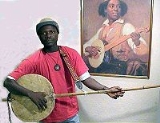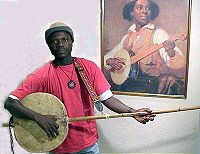
Daniel Laemouahuma Jatta
Encyclopedia

Jola people
The Jola are an ethnic group found in Senegal , The Gambia, and Guinea-Bissau. There are great numbers on the Atlantic coast between the southern banks of the Gambia River, the Casamance region of Senegal and the northern part of Guinea-Bissau...
scholar and musician
Musician
A musician is an artist who plays a musical instrument. It may or may not be the person's profession. Musicians can be classified by their roles in performing music and writing music.Also....* A person who makes music a profession....
from Mandinary, Gambia, who pioneered the research and documentation of the akonting
Akonting
The akonting is the folk lute of the Jola people, found in Senegal, Gambia, and Guinea-Bissau in West Africa...
, a Jola folk lute, as well as the related Manjago folk lute, the buchundu, in the mid-1980s. Prior to Jatta's work, these instruments were largely unknown outside the rural villages of the Senegambia region of West Africa
West Africa
West Africa or Western Africa is the westernmost region of the African continent. Geopolitically, the UN definition of Western Africa includes the following 16 countries and an area of approximately 5 million square km:-Flags of West Africa:...
.
Contribution to knowedge of West African music
In the 1960s, scholars and writers began to seriously examine the traditional music of West Africa in their search for the roots of the bluesBlues
Blues is the name given to both a musical form and a music genre that originated in African-American communities of primarily the "Deep South" of the United States at the end of the 19th century from spirituals, work songs, field hollers, shouts and chants, and rhymed simple narrative ballads...
, jazz
Jazz
Jazz is a musical style that originated at the beginning of the 20th century in African American communities in the Southern United States. It was born out of a mix of African and European music traditions. From its early development until the present, jazz has incorporated music from 19th and 20th...
, and the other music forms that had emerged in the African diaspora
African diaspora
The African diaspora was the movement of Africans and their descendants to places throughout the world—predominantly to the Americas also to Europe, the Middle East and other places around the globe...
. However, in this quest there was very little study and documentation of West African stringed instruments done other than in the overall context of general musical and cultural traditions. For the most part, the only stringed instruments to receive specific attention were those of the griots, such as their plucked lutes (e.g. the Mande ngoni
Xalam
Xalam, also spelled khalam, is the Wolof name for a traditional stringed musical instrument from West Africa. The xalam is thought to have originated from modern-day Mali, but some believe that, in antiquity, the instrument may have originated from ancient Egypt...
, the Wolof
Wolof people
The Wolof are an ethnic group found in Senegal, The Gambia, and Mauritania.In Senegal, the Wolof form an ethnic plurality with about 43.3% of the population are Wolofs...
xalam
Xalam
Xalam, also spelled khalam, is the Wolof name for a traditional stringed musical instrument from West Africa. The xalam is thought to have originated from modern-day Mali, but some believe that, in antiquity, the instrument may have originated from ancient Egypt...
, the Fula
Fula people
Fula people or Fulani or Fulbe are an ethnic group spread over many countries, predominantly in West Africa, but found also in Central Africa and Sudanese North Africa...
hoddu, the Soninke gambare, and the kora
Kora (instrument)
The kora is a 21-string bridge-harp used extensively in West Africa.-Description:A kora is built from a large calabash cut in half and covered with cow skin to make a resonator, and has a notched bridge. It does not fit well into any one category of western instruments and would have to be...
(the 21-string harp-lute of the Mandinka
Mandinka people
The Mandinka, Malinke are one of the largest ethnic groups in West Africa with an estimated population of eleven million ....
griots).
Griots are male members of hereditary music and word artisan
Artisan
An artisan is a skilled manual worker who makes items that may be functional or strictly decorative, including furniture, clothing, jewellery, household items, and tools...
caste
Caste
Caste is an elaborate and complex social system that combines elements of endogamy, occupation, culture, social class, tribal affiliation and political power. It should not be confused with race or social class, e.g. members of different castes in one society may belong to the same race, as in India...
s found in certain West African Islamized
Muslim
A Muslim, also spelled Moslem, is an adherent of Islam, a monotheistic, Abrahamic religion based on the Quran, which Muslims consider the verbatim word of God as revealed to prophet Muhammad. "Muslim" is the Arabic term for "submitter" .Muslims believe that God is one and incomparable...
peoples with similar tripartie caste systems. The griot phenomenon is limited to the various peoples of the Mande language family - some 53 related ethnic group
Ethnic group
An ethnic group is a group of people whose members identify with each other, through a common heritage, often consisting of a common language, a common culture and/or an ideology that stresses common ancestry or endogamy...
s, such as the Bamana (or Bambara), Mandinka, Malinke, Susu
Susu people
The Soso are a major Mande ethnic group living primarily in Guinea. Smaller communities are also located in the neighboring countries of Sierra Leone, Senegal and Mali. The Susu are descendants of the thirteenth century Mali Empire...
, Soninke, and so on - as well as the non-Mande Wolof
Wolof people
The Wolof are an ethnic group found in Senegal, The Gambia, and Mauritania.In Senegal, the Wolof form an ethnic plurality with about 43.3% of the population are Wolofs...
, the western Fulas or Fulani
Fula people
Fula people or Fulani or Fulbe are an ethnic group spread over many countries, predominantly in West Africa, but found also in Central Africa and Sudanese North Africa...
, Songhai (also Songhay), Sereer, Lebu
Lebu
Lebu may refer to:* Lebu, Chile, a city and capital of the Arauco Province of the Biobio Region of Chile* Lebu River, located in the Arauco Province of the Biobio Region of Chile* LEBU, acronym for Large Eddy Break Up...
, and Tukulóor.)
In 2000, Jatta presented his research findings and introduced the Jola akonting
Akonting
The akonting is the folk lute of the Jola people, found in Senegal, Gambia, and Guinea-Bissau in West Africa...
at the Third Annual Banjo Collectors Gathering, an annual international conference of the foremost collectors and scholars of 19th and early 20th century banjo
Banjo
In the 1830s Sweeney became the first white man to play the banjo on stage. His version of the instrument replaced the gourd with a drum-like sound box and included four full-length strings alongside a short fifth-string. There is no proof, however, that Sweeney invented either innovation. This new...
s. The annual Banjo Collectors Gatherings also serve as the principal forums for the presentations of new research on the banjo's history and organology
Organology
Organology is the science of musical instruments and their classification. It embraces study of instruments' history, instruments used in different cultures, technical aspects of how instruments produce sound, and musical instrument classification...
.
Jatta's presentation, in which he performed on the akonting and showed film footage of other Jola musicians playing the instrument, made for quite a sensation. Up until that point, the conventional wisdom was that the wooden-bodied plucked lutes exclusive to the West African griots, such as the Mande ngoni
Xalam
Xalam, also spelled khalam, is the Wolof name for a traditional stringed musical instrument from West Africa. The xalam is thought to have originated from modern-day Mali, but some believe that, in antiquity, the instrument may have originated from ancient Egypt...
and the Wolof xalam
Xalam
Xalam, also spelled khalam, is the Wolof name for a traditional stringed musical instrument from West Africa. The xalam is thought to have originated from modern-day Mali, but some believe that, in antiquity, the instrument may have originated from ancient Egypt...
, were the archetypes for the earliest forms of the banjo, first made and played by enslaved
Slavery
Slavery is a system under which people are treated as property to be bought and sold, and are forced to work. Slaves can be held against their will from the time of their capture, purchase or birth, and deprived of the right to leave, to refuse to work, or to demand compensation...
West Africans in the New World, from the 17th century on. Jatta's proposition that gourd-bodied non-griot folk and artisan lutes - like the Jola akonting (Senegal
Senegal
Senegal , officially the Republic of Senegal , is a country in western Africa. It owes its name to the Sénégal River that borders it to the east and north...
, Gambia, Guinea-Bissau
Guinea-Bissau
The Republic of Guinea-Bissau is a country in West Africa. It is bordered by Senegal to the north, and Guinea to the south and east, with the Atlantic Ocean to its west....
), the Manjago buchundu (Gambia, Guinea-Bissau), the Gwari kaburu
Kaburu
Kaburu is a Swedish free improvisation duo that was formed in 2004 by the multi-instrumentalist Thomas Toivonen and the percussionist/actor Iggy Malmborg. According to them, 'Kaburu is a direct action on the world that surrounds them and their musical expression is an attempt to go beyond the...
(Nigeria
Nigeria
Nigeria , officially the Federal Republic of Nigeria, is a federal constitutional republic comprising 36 states and its Federal Capital Territory, Abuja. The country is located in West Africa and shares land borders with the Republic of Benin in the west, Chad and Cameroon in the east, and Niger in...
), and the Frafra
Frafra
Frafra is a colonialist term given to a subset of Gurunsi peoples living in northern Ghana and their language. The larger group of Gurunsi peoples inhabit both southern Burkina Faso and northern Ghana...
koliko (Ghana
Ghana
Ghana , officially the Republic of Ghana, is a country located in West Africa. It is bordered by Côte d'Ivoire to the west, Burkina Faso to the north, Togo to the east, and the Gulf of Guinea to the south...
), to name but a few - were the more likely candidates was revolutionary.
Since then, many museums around the world have updated their collections to include the akonting and other members of the West African folk/artisan lute family, while banjo historians and ethnomusicologists have begun to broaden the range of their focus to include these instruments as well those used by griots.

